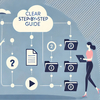
We hear the term “topic-based authoring” quite a lot. ClickHelp is software for help writers that supports the topic-based approach. But how did it come to be? What makes topic-based authoring superior in modern techcomm? And, finally, how is it different from modular help writing?
Let’s try figuring this out.
Predecessor of Topic-Based Authoring
For technical writers, it all began with so-called narrative authoring. Since the day first technical documentation was written, up until quite recently there was only narrative authoring. It means that when you needed to create a technical document describing a certain process or containing instructions on how to go about this process, you would just open a clear page and start writing each technical document from the title to its end.
That’s how help authoring was done for hundreds of years. But, of course, when the concept of online documentation came about, things started shifting rapidly.
Underlying Reasons for Topic-Based Approach to Appear

What is a topic to start with? Wikipedia describes it as ‘a discrete piece of content that is about a specific subject, has an identifiable purpose, and does not require external context to understand.’
It is clear that using topics as the primary items of technical documentation is extremely convenient, as this allows building a coherent structure of topics that can be intuitively navigated with the help of a table of contents. But there’s more.
The rise of new age technical documents started in the ‘90s. Documentation began moving away from printed formats. Online help systems became the moving force behind topic-based technical writing.
The main reason for the topic-based approach to become a thing is content reuse. As soon as creating user manuals became more tied to using help authoring tools, the idea of content reuse revolutionized the industry and showed direction for further development.
Not only topics can be reused, but also their parts. This approach keeps evolving as modern tools for help writers are continuously improving this functionality. You can read on single-sourcing techniques available in ClickHelp to see for yourself how far we’ve come in providing great content reuse options.
Modular Authoring

In reality, topic-based authoring can be part of modular authoring. A modular authored project presupposes that different techcomm experts are working on different parts of it. And, they can still be applying the topic-based approach. This practice is common for technical writing in military, shipping, aircraft, etc.
The modular approach relies heavily on standards. Otherwise, the final product will be just a compilation of data that one won’t be able to merge due to incompatible formats. Standards bring order to this process and allow modular authoring to be successful.
On a side note, you might want to get acquainted with the notion of Simplified Technical English as it will give you more insight into standards and how the techcomm society is working together to improve them through simplification making adoption and learning curve easier for new users.
Conclusion
Topics like this give us the opportunity to see the bigger picture. Which is always nice – we can truly see how the technical writing industry keeps changing. With content reuse becoming possible tech writers got the opportunity to focus more on UX, content depth and quality. With all these changes and approaches, better user manuals are to come!
Good luck with your technical writing!
ClickHelp Team
Author, host and deliver documentation across platforms and devices



